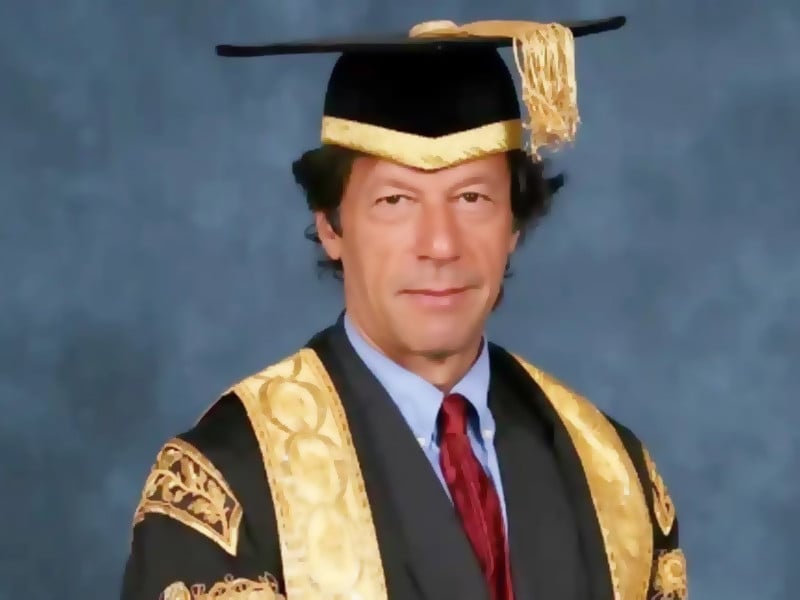The University of Oxford, a global exemplar of academic excellence and prestige, known for producing some of the world’s greatest minds, is at the crucial point.
It faces a polemic decision: whether to elect Imran Khan, the former Prime Minister of Pakistan and cricket legend, as its next Chancellor.
Khan’s bid has stirred major controversy, mainly due to his controversial stance on the Taliban and other extremist groups, raising critical questions about whether he represents the values that Oxford holds dear which are all about tradition, intellect, and setting the gold standard in education.
But now, they are dealing with something that is more tabloid than textbook.
In the land of the pure, where the powerful pretend to be pious, a new game is afoot. Khan, a 1975 graduate of Oxford’s Keble College, has spent the past year imprisoned on corruption charges in Pakistan.
His entry into this prestigious race has stirred up a hornet’s nest, not just because of his current residency in a Pakistani jail, but due to a history that is as colorful as it is controversial.
Regardless of his claims that these are politically motivated charges, his spotty record raises serious concerns that go beyond the courtroom. Yup, you read that right.
And the whole Gen-Z is having a field day, with reactions ranging from “you’ve got to be kidding me” to “oh, this is going to be good.”
A critical aspect of contention is also his well-documented support for the Taliban regime in Afghanistan. Imran Khan has openly referred to the Taliban as “freedom fighters,” and at one point he proposed to establish a Taliban office in Pakistan, a move that was heavily criticised.
This stance has raised concerns about his alignment with a group known for its human rights abuses and repression of women, minorities, and dissenting voices.
Corruption allegations have not just plagued Imran Khan’s career but also put his bid to become Chancellor of Oxford University in peril.
Charges of illicitly selling state gifts for over $490,000 and the dubious handling of Al-Qadir Trust funds allegedly have been a source for receiving bribes and have cast a dark shadow over his bid.
He says it’s all politically motivated, but when you have got that many skeletons in your closet, it is hard to keep the door shut.
Oxford’s been around since 1096, long enough to know the difference between a leader and a loose cannon. And here is the thing—Khan’s not exactly the squeaky-clean candidate you would expect for a role like this.
Critics are of the view that Imran’s legal woes and questionable ethics starkly contrast with Oxford’s hallmarks of integrity and transparency.
To secure the chancellorship, Imran attempts to ride on his academic prestige but the mounting scrutiny of his legal battles threatens to derail his aspirations, escalating the dramatic clash of ideals and ambitions. Let’s just say it’s got people wondering if he is a bit, well, delulu.
Oxford, with its commitment to diversity and gender equality, probably was not planning on dealing with this kind of PR nightmare.
But here we are. Imran’s controversial remarks about women’s rights where he has repetitively blamed women’s clothing for incidents of sexual violence, disseminating harmful stereotypes that shift responsibility away from perpetrators to victims.
These outdated views are extremely damaging, particularly in a global context where gender equality remains a pressing issue.
But, what is even more damaging is Imran’s admiration for Osama Bin Laden, whom he referred to as a “shaheed” (martyr) in the National Assembly of Pakistan.
Because, you know, glorifying figures associated with terrorism is totally okay.
This sentiment unambiguously diverges from the principles of peace, human rights, and ethical leadership that Oxford University upholds.
This particular nomination poses a significant risk to the university’s commitment to fostering a progressive and inclusive global community, with his associations with extremist views and regressive attitudes.
So, while Oxford’s alumni and staff gear up to cast their votes, the major concern here is whether Oxford will choose to uphold its legacy of leadership and ethical integrity or risk besmirching its reputation by associating with a figure whose actions and beliefs have sparked global concern.
The question remains, will Oxford choose to uphold its legacy of leadership and ethical integrity or risk besmirching its reputation by associating with a figure whose actions and beliefs have sparked global concern?
Only time will tell, but one thing is for sure, Imran Khan’s bid is a classic case of delulu.
Choosing Khan might make for some spicy headlines, but it could also make Oxford the subject of memes and Twitter threads for all the wrong reasons.
The university’s next move will show whether it’s ready to maintain its high standards or if it’s willing to roll the dice on a candidate who’s all about breaking the mold—and maybe a few other things along the way.
This candidacy also presents a complex dilemma for the institution, testing its commitment to its legacy of ethical leadership and academic prestige.







